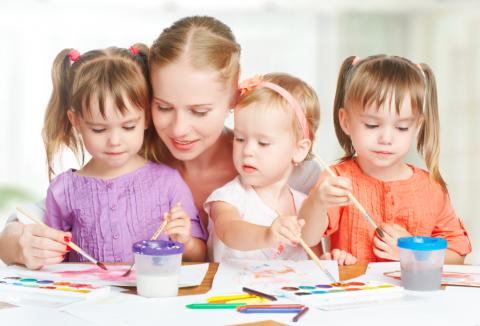
The terms Tagesmutter (female) and Tagesvater (male) can be translated in English as childminder or in-home day-care provider. We only recommend childminders who have a valid Pflegeerlaubnis (childcare licence). These are also listed with the Jugendamt (youth welfare office) and to some extent with the Tagespflegeverein association (Tageseltern association) or the like in the region.
Important: if you are looking for a Tagesmutter/-vater place you should begin your search at least six months before you need it!
If you want to search for yourself?
Information centres for finding a day care provider and local contact persons
Day care provided by childminders is regulated by municipal authorities, with regard to both the organisation (youth welfare office, childminder associations) as well as the subsidisation of their fees. Overview of subsidies. Childcare provided by Tageseltern is subsidised by the local authority and is therefore often less expensive than a private nanny.
What do Tagesmütter/-väter do?
The terms Tagesmutter (female) and Tagesvater (male) can be translated in English as childminder or in-home day-care provider. They work on a self-employed basis and look after up to five children in either their own or rented premises. This means they provide a familiar and personal setting for children under three, so they provide a good alternative in Germany to a Krippe (daycare centre for children aged three or younger). Tageseltern have completed a childcare qualification and are checked by the Jugendamt (youth welfare office) for proof of their professional and personal suitability; their childcare qualifications; the suitability of their premises; and the presentation of a certificate of health as well as a police criminal check (compulsory for all family members living in the household).
A person providing day care is supposed to “encourage the development of the child into an independent and sociable personality” according to the German social security statutes (§22 SGB VIII). This is dependent on the both individual skills and inclinations of the childminder as well as on their familial situation and the childcare facilities available to them. Some prerequisites are age-appropriate toys, opportunities for the children to exercise, space for them to run around but also space where they can be quiet. Collaboration and regular contact between the childminder and the parents are important for the child’s support.
More information can be found in the Handbuch Kindertagespflege of the German Bundesfamilienministerium and on website of the federal association of childcare providers (Bundesverband Kindertagespflege).
Großtagespflegestellen” (Multiple childminders working together)
In certain German states, a group of child care professionals can get authorization to jointly look after more than five children. In most cases two or more childminders join forces and look after the children together. This arrangement is generally called a “Großtagespflege”.
Often, these organisations are similar to mini day-care centres, in that they have carers who can take over the day care if one of the childminders is ill.
The day care generally takes place in rooms rented additionally by the Tagesmütter/-väter.
The ways the Großtagespflege are run and their quality can vary greatly, since each Bundesland (Federal state) ensures the quality standards independently.